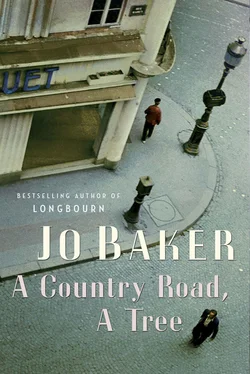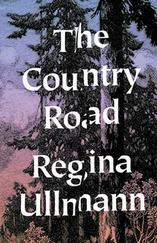“Do you think?”
“Halves the chances of being caught.”
“Doubles it?”
A dog bays; they flinch down, speak very low.
“Closer.”
“Think so.”
“Have you got anything?”
He doesn’t follow. “Cigarette?”
“No. If they get their hands on you.” A heave of breath. “For that.”
“Oh. No. Have you?”
A nod. “I don’t think mine will stretch.”
The man leans back against the trunk, his belly heaving like a frog’s, and closes his eyes.
He, though, hunkered down in the fallen leaves, looks round him, rubbing at his arms. He feels the chill. He doesn’t want this. He can’t face this. The words feel childlike, Boy’s Own:
“We could swim the lake,” he says. “Doesn’t that put dogs off a scent?”
The man’s eyes open, his irises black in the half-light. “And if we got away from this lot, we’d just get picked up by the next patrol. Soaked through, in the Sixteenth.”
“There is that.”
Then eyes widen: boots thud past behind them along the footpath they’ve just left. They hold their breath. Just one man, going at a run; he’s gone, and the breath slides out of them again.
“Have you got much you can give them?” the man asks.
He swallows. “A bit.”
“That’s the problem, isn’t it? People. People you can hurt.”
“People are always the problem.”
The fellow sinks down off his hunkers so that he’s now sitting on a root. He draws his knees up. The noise seems to be coming from all directions now, men and dogs, and with it the scrape of torch beams through branches, tree trunks, the failing light. They’re done for, surely.
“I can’t see how we can be worth all this madness.”
Still on his hunkers, he rests a hand, fingers tented, on the bole. He peers around through the trees; he glances back towards the path. They can’t move. They can’t stay where they are. They can’t both kill themselves, and he for one finds that he would much rather survive the night. Suzanne is waiting for him, and will be annoyed if he does not show up. So what’s left? The grained, elephantine bark beneath his fingertips. His eyes slide upward, through drooping branches and the fading rusty leaves, right up into the canopy of the sycamore. It is dim in the gathering dusk and still thick with foliage. Head tilted back, his balance fails and he has to steady himself. The set of his features changes; the lines shift around his eyes.
He turns back towards the little man, taps knuckles against his arm.
Eyebrows up, his expression: What?
He jerks his head upward.
The man twists his head to peer up along the rising height of the tree. His Adam’s apple rolls down then back up his throat. “I don’t like heights,” he says.
He, though, unfolds himself, looks upward, dusting off his hands. A moment, then the other man gets stiffly to his feet. They stand side-by-side, a pair of schoolboys considering the climb. There are strong drooping branches, but they’re only low enough to get hold of at some distance from the tree, leaving one out, as it were, on a limb. Close to the trunk, nothing’s within easy reach, at least for the smaller man. So the only thing for it: back set to the tree, a cup made of his palms, he offers a boost. The other fellow swallows queasily, but sets a boot in the hands and is heaved upward. A grab for the lowest bough, a foot on his shoulder, then the weight is gone and the other fellow’s scrambling up amongst the branches. He leaps for the lowest branch and pulls himself up after, satchel swinging.
The little man clambers up a few branches and then stops, and shakes his head at the notion that he might go any higher. A pat on the shoulder, and then the reach and swing that is so long ago and so familiar, the memory buried in his muscles and his nerves. Even the sting of the palms. He remembers that.
Perched high above, his back to the trunk, astride a beam, he tucks his dark muffler over the pale line of his shirt collar, tugs his sleeves down over his cuffs; they are more grey than white but they would still show up in a flashlight. He hooks his arm around a higher branch, tucks his bag close and ducks his nose down into his scarf. It’s all right, actually.
Across the woods, saplings and undergrowth shiver with movement; he can hear the crunch and thrash of men through the brushwood; flashlights swipe across the dark.
He chews at the inside of his cheek. He closes his eyes. Takes himself away to this: the white road gleams under the travellers’ ragged feet, and the dun field glows, and the sky above is a translucent slate-blue; the delineation brisk, the outlines strong; the whole thing is as luminous as a stained-glass window. The light of that other world beyond shines through for Rouault, as it cannot shine for him.
When he opens his eyes again, he can still see the bundle of the man below him, clinging to the trunk like a fungus.
The dark gathers; it rises from the earth like groundwater. Above, the stars prick through. It’s getting cold. He shifts, resettles himself. He eases out the ache in his neck. The wind stirs the tree, and the branch heaves and the trunk sways and the leaves rustle and clouds scud across the sky. The voices come and go. The dogs are distant, then nearer again. He dozes, wakes. Suzanne will be annoyed. He lays his cheek against his arm and dreams.
He falls, arms spread, through the painless brush of branches and the soft caress of twigs and needles, and it is all perfectly pleasant while he falls, but when he hits the ground he will be dead.
He blinks awake. His eyes open on the drop: fifty foot to the bare ground. He has slumped forward in his sleep, his whole weight hangs from that one arm. Between him and the root-troubled earth is the hunched form of his friend, still clamped to the bole. It’s lighter now; the night is fading into day and they are both still there. Still ticking on.
He shifts his grip, struggles himself up. His arm has gone to sleep and his chest aches. He clambers down until he is alongside his friend, one hand on a higher branch, one foot dangling, perched neatly.
“How’s it going?” he asks.
The man peels his face from the trunk; he blinks. His cheek is printed with bark. He smells musky. He doesn’t speak.
“You stiff?”
A slow blink. The fellow’s eyes are glazed; he doesn’t seem to be taking anything in.
“All right, old chap. Help you down. If you could just—”
But his friend just lays his face against the trunk again, and does not move.
But it is really, really time to go. Before the early-morning dog-walkers notice them; before the search party turns up and has another go. What to do? He climbs down one branch so he is below now, and turns his face away from the smell of urine.
“Just give me your foot, there’s a good chap. Just in my hand.”
The man shakes his head.
“Come on now; it’s a simple affair. I used to do it all the time as a boy; I bet you did too.” This is something of a lie: he climbed up trees all the time. He rarely had to trouble himself with climbing down.
The voice is tacky and dry. “I don’t like heights.”
“I know, I know, I see that. But…” The boot in his hands now. “Try.” He coaxes the boot off the joint of branch and trunk where it is wedged, and pulls it lower. His friend remains stiff and resistant.
“All right?”
“No.”
But the foot shakingly descends.
They inch their way, foothold-handhold, foothold-handhold, down to the lowest bough. He drops loosely to the ground and turns to coax the smaller man to drop; he staggers backward with him in his arms.
“And there we are. Terra firma. ”
The man looks around him vaguely. He rubs his face, digs at his closed eyes. “We’ll go…we’ll go to…the hotel.”
Читать дальше










